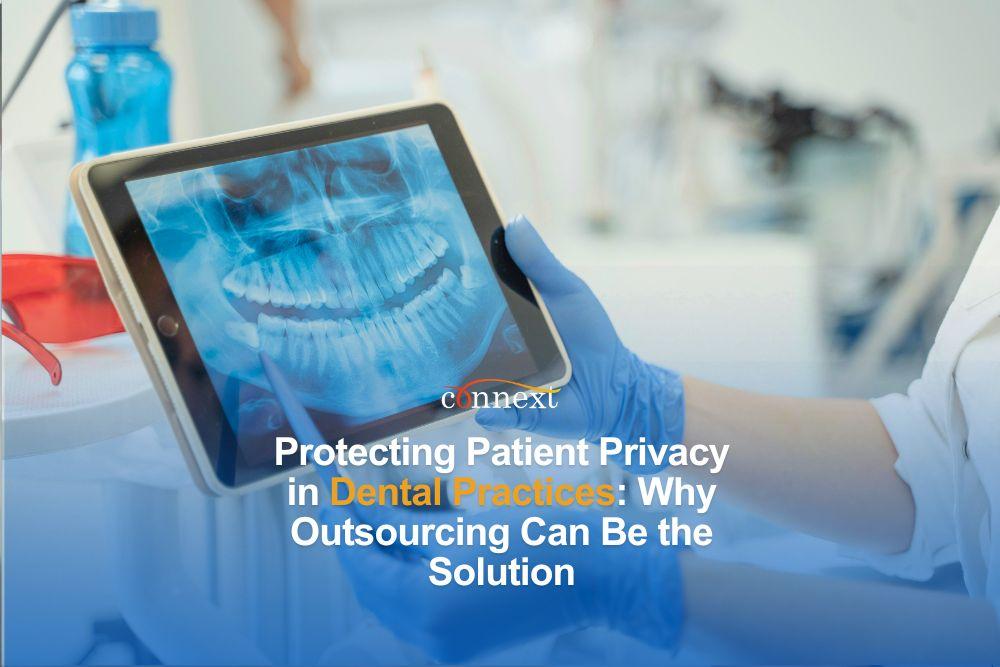The article talks about how outsourcing patient privacy in dental practices can help your practice. By outsourcing to a privacy-compliant provider like Connext, you gain access to specialized expertise and robust security systems. Healthcare data breaches are escalating at an alarming rate, with patient records becoming increasingly valuable targets for cybercriminals.

Photo by Tima Miroshnichenko
In 2023, the U.S. healthcare sector experienced 725 reported data breaches, compromising over 133 million patient records. In 2024, Australia experienced one of its largest data breaches ever affecting 12.9 million of its citizens when their personal medical information was hacked via a prescription medicine delivery service.
Dental practices can also become targets as they juggle sensitive patient information daily. Outsourcing can lighten the load but without airtight safeguards, it’s a gamble. One misstep could mean violations under the Health Insurance Portability and Accountability Act (HIPAA), reputational fallout, and lost patients.
The solution? Partnering with a privacy-compliant outsourcing provider. It’s a game-changer, protecting patient data, ensuring compliance, and strengthening trust – all while supercharging your dental clinic’s operations.
Why patient privacy matters in dental practices
Patient privacy isn’t just a regulatory requirement for dental practices – it’s the foundation for trust and a key to operational success. Given the vast amount of sensitive information dental practices manage daily, safeguarding this data is non-negotiable.
Compliance: A legal and ethical obligation
Dental practices must adhere to strict regulations like the HIPAA, which governs how Protected Health Information (PHI) is handled. These laws ensure patient data is secure and accessed only by authorized personnel.
Failing to comply with HIPAA isn’t just risky – it’s costly. Violations can result in audits, fines of up to $50,000 per infraction, and even the penalty of imprisonment. Adhering to these standards protects both patients and the integrity of the practice.
The trust factor: Building patient loyalty
Trust is at the heart of patient relationships. Patients are more likely to stay loyal and recommend a practice when they’re confident their personal and medical information is secure. Conversely, a single data breach can shatter that trust. Patients may leave your practice for competitors who demonstrate better data protection.
Consequences of non-compliance
The impact of a data breach extends far beyond regulatory penalties:
- Financial impact: In addition to penalties, there are costs for investigation, remediation, and patient notification.
- Legal repercussions: Practices may face lawsuits from affected patients.
- Reputational damage: Negative publicity can discourage prospective patients and drive existing ones away.
Why it all matters
By prioritizing patient privacy, dental practices not only comply with legal standards but also safeguard their reputation and foster loyalty. In an era of increasing cyber threats, these efforts are essential to maintaining a successful practice.
The stakes couldn’t be higher, but the solutions are within reach. Transitioning to secure, privacy-compliant practices ensures both patient trust and peace of mind.
Challenges in maintaining patient privacy in-house
Maintaining patient privacy is a complex, resource-intensive task for dental practices. Despite their best efforts, in-house management often falls short due to several critical challenges.
Data management overload
Dental practices handle an immense volume of sensitive records, from medical histories to insurance details. Without robust systems, even minor oversights – like improperly stored files – can lead to significant breaches. As workloads grow, overburdened teams become more prone to errors.
Compliance complexity
Healthcare regulations, such as HIPAA, are constantly evolving. Staying compliant demands ongoing training, regular audits, and a deep understanding of legal requirements. For in-house teams already stretched thin, keeping up with these changes can be overwhelming.
Human error risks
Human error continues to be a major contributor to data breaches. Common pitfalls, such as sending unencrypted emails, misplacing files, or failing to update security protocols, can expose sensitive patient information. Even with the best intentions, errors are inevitable without specialized training.
Limited IT support
Many dental practices lack the resources for around-the-clock IT monitoring and advanced cybersecurity measures. This gap leaves them vulnerable to external threats, such as hacking and ransomware, which can compromise patient data.
Resource constraints
Smaller practices, in particular, face significant budgetary and staffing limitations. Privacy management often competes with other operational priorities, leaving it underfunded and under-resourced.
Addressing these challenges requires more than internal effort: it demands expertise, tools, and processes that many practices simply cannot sustain on their own. Outsourcing offers a strategic solution, enabling dental practices to focus on patient care while ensuring robust privacy safeguards.
Key considerations for outsourcing patient-related tasks
Outsourcing patient-related tasks offers many benefits, but ensuring patient privacy and compliance requires careful planning. By focusing on these key factors, dental practices can protect sensitive information while improving operational efficiency.
Choosing the right partner
Selecting the right outsourcing provider is critical to safeguarding patient data. Look for a partner who demonstrates:
- Strict health data security compliance: Ensure they adhere to national healthcare regulations and privacy laws with a well-documented compliance program.
- Advanced security measures: Providers should employ robust security technologies such as encryption, firewalls, and intrusion detection systems.
- Comprehensive staff training: Regular employee education on privacy, health
- regulatory guidelines and cybersecurity best practices are essential to minimize risks.
- Physical security: Verify that their facilities are equipped with access controls, surveillance systems, and secure storage protocols.
Effective contractual agreements
A well-structured outsourcing contract provides clarity and mitigates risks. Key elements to include:
- Data sharing protocols: Clearly define what data will be shared, how it will be used, and who will have access to it.
- Ownership and retention policies: Specify data ownership rights and outline retention periods to ensure compliance with legal and regulatory standards.
- Incident response plans: Include detailed steps for managing potential data breaches, from containment to notification and resolution.
By prioritizing these considerations, dental practices can outsource patient-related tasks with confidence, safeguarding their reputation and ensuring compliance while enhancing operational efficiency. Transitioning to the next section, let’s explore the tangible benefits practices can achieve with the right outsourcing partner.
Features and benefits of privacy-compliant call centers
Privacy-compliant call centers play a pivotal role in safeguarding patient data for dental practices. These specialized providers combine robust features with practical benefits to ensure patient information remains secure while enhancing operational efficiency.
Key features
Privacy-compliant call centers offer advanced tools and protocols to protect sensitive information:
- Data handling protocols: Virtual desktop software ensures no local storage of patient data, reducing the risk of breaches.
- Thorough employee vetting: Comprehensive background checks and biometric authentication prevent unauthorized access to sensitive information.
- IT and physical security: Providers implement 24/7 IT monitoring alongside secured facilities equipped with surveillance systems and controlled access.
- Compliance training: Regular and mandatory training keeps staff updated on the latest privacy laws, HIPAA regulations, and data security best practices.
Practical benefits
Partnering with a privacy-compliant call center delivers measurable advantages to dental practices:
- Cost efficiency: Outsourcing reduces operational expenses by eliminating the need for in-house resources without compromising on compliance or quality.
- Specialized expertise: Privacy-focused call centers bring deep knowledge of healthcare regulations, ensuring adherence to stringent standards.
- Enhanced patient experience: Secure and transparent data handling builds patient trust, leading to higher satisfaction and loyalty.
By using the features and benefits of privacy-compliant call centers, dental practices can strengthen their approach to data security while focusing on delivering excellent patient care. Next, let’s explore actionable strategies to seamlessly integrate these solutions into practice operations.
Best practices for maintaining patient privacy in outsourced call centers
Strengthening patient privacy in outsourced call centers requires implementing best practices that ensure compliance and security. These steps provide a framework for protecting sensitive data and building trust with patients.
Practice data minimization
Limit the information shared with call center providers to only what is essential for specific tasks. By reducing the amount of accessible data, you minimize the risk of exposure in the event of a breach.
Secure communication channels
Transmit sensitive information through encrypted emails and secure portals to protect data during transfer. These channels add an extra layer of security, ensuring unauthorized parties cannot intercept or misuse patient data.
Conduct regular security audits
Schedule routine third-party security audits to identify vulnerabilities and verify compliance with industry standards, including HIPAA regulations. Regular evaluations help keep systems updated and prevent potential breaches.
Prioritize employee training and awareness
Ensure call center employees receive continuous training on evolving privacy standards, cyber threats, and proper data handling protocols. Well-informed staff act as the first line of defense against errors and breaches.
Develop a comprehensive incident response plan
Prepare for the unexpected by establishing a robust incident response plan. This plan should outline steps to contain breaches, notify affected parties promptly, and comply with reporting requirements to regulatory bodies.
By implementing these best practices, dental practices can maintain robust patient privacy while leveraging the expertise and cost-efficiency of outsourced call centers. These proactive measures not only safeguard data but also reinforce patient trust and compliance.
Conclusion
Maintaining patient privacy goes beyond compliance; it’s about safeguarding your reputation and fostering long-term relationships with your patients. By outsourcing to a privacy-compliant provider like Connext Global Solutions, you gain access to specialized expertise and robust security systems that mitigate risk and drive efficiency.
Take the next step in securing your practice’s future: get in touch with Connext Global Solutions today and take your dental practice’s privacy strategy to the next level.
References
Alder, Steve. “Healthcare Data Breach Statistics.” The HIPAA Journal, 24 Nov. 2024, https://www.hipaajournal.com/healthcare-data-breach-statistics/.
Lavoipierre, Ange. “MediSecure Reveals 12.9 Million Australians Had Personal Data Stolen in Cyber Attack Earlier This Year – ABC News.” ABC (Australian Broadcasting Corporation), ABC News, 18 July 2024, https://www.abc.net.au/news/2024-07-18/medisecure-data-cyber-hack-12-million/104112736.
“What Are the Penalties for HIPAA Violations?” The HIPAA Journal, https://www.hipaajournal.com/what-are-the-penalties-for-hipaa-violations-7096/. Accessed 21 Dec. 2024
Follow us on:
Facebook: Connext
LinkedIn: Connext
Instagram: @connextglobalsolutions_
Twitter: @ConnextPh





